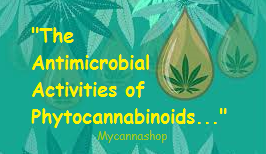Novel antimicrobial drugs are urgently needed to counteract the increasing occurrence of bacterial resistance. Extracts of Cannabis sativa have been used for the treatment of several diseases since ancient times.
It has been demonstrated that several cannabinoids show potent antimicrobial activity against primarily Gram-positive bacteria including methicillin-resistant Staphylococcus aureus (MRSA). As first in vivo efficacy has been demonstrated recently, it is time to discuss whether cannabinoids are promising antimicrobial drug candidates or overhyped intoxicants with benefits.
The worldwide spread of bacterial resistance against market antibiotics has been identified as one of the major threats to public health by scientists and healthcare authorities. Thus, new antibacterial strategies and antibacterial compounds are urgently needed to counteract the increasing occurrence of antibiotic-resistant and, especially, multidrug-resistant (MDR) pathogens, to keep the live-saving advantages toward bacterial pathogens.
In 2017, the World Health Organization (WHO) emphasized the crucial need for antimicrobial drug development against a group of 13 different genii, families, and specific species of pathogenic bacteria.The real problem is that the vast majority of these prioritized bacterial pathogens are drug-resistant Gram-negative bacteria.
However, antimicrobial resistances are also increasing in Gram-positive bacteria and, among the high priority pathogens, the Gram-positive pathogen Staphylococcus aureus is the leading cause of both healthcare and community-associated infections worldwide, and a major cause for morbidity as well as mortality.





